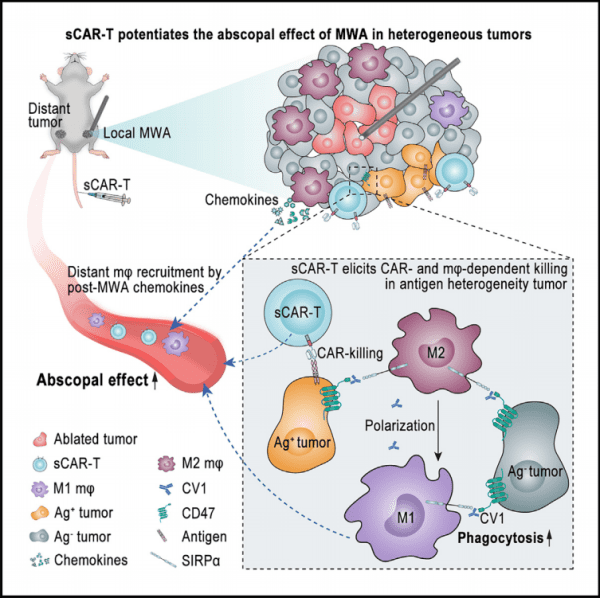News Express: UM research team develops new technology for liver cancer treatment
新聞快訊:澳大團隊開發治療肝癌新技術

分泌CV1的CAR-T與微波消融聯合可協同增效治療肝癌遠處轉移的示意圖
An illustrative diagram of how combining CV1-secreting sCAR-T cells and microwave ablation can enhance the treatment of distant metastasis in liver cancer
澳大團隊開發治療肝癌新技術
澳門大學健康科學學院副教授趙琦的研究團隊聯合廣州醫科大學教授朱康順的研究團隊,在腫瘤免疫研究領域取得重大突破。該研究成功開發了一種能夠分泌SIRPα變體CV1的新型CAR-T細胞(sCAR-T),並結合微波消融(MWA)技術,顯著增強對肝癌遠處轉移的治療效果,為廣大肝癌患者帶來新希望。相關研究成果在國際細胞免疫領域備受矚目,已發表於《細胞》雜誌子刊《細胞報告醫學》(Cell Reports Medicine)。
微波消融等熱消融技術通過醫學影像設備引導,利用局部高溫實現肝癌的原位滅活。因其療效顯著且創傷性小,被多項海內外臨床指南推薦用於肝癌治療。然而,消融後復發率較高,嚴重影響患者的遠期生存率。研究表明,微波消融可激發全身免疫反應以控制轉移或殘留腫瘤,即所謂的“遠隔效應”。但該效應通常較弱且持續時間短,難以有效殺傷腫瘤。此前研究發現,將消融技術與嵌合抗原受體T細胞(CAR-T)療法相結合,雖能有效抑制遠隔腫瘤生長,但此方法對靶抗原均質腫瘤效果較佳,而對抗原異質性腫瘤作用有限。
針對這一難題,研究團隊設計並構建了可分泌SIRPα(CV1)的sCAR-T細胞。該新型CAR-T細胞不僅具有高親和力,還能特異性阻斷肝癌中限制巨噬細胞吞噬功能的“別吃我”(CD47-SIRPα)信號通路。研究表明,在聯合微波消融治療時,sCAR-T細胞可顯著增強對遠隔抗原異質性腫瘤的殺傷作用。而sCAR-T細胞在靶向殺傷腫瘤的同時,其分泌的CV1可阻斷CD47-SIRPα通路,激發浸潤巨噬細胞的抗腫瘤活性,進而殺傷抗原陰性或低水平表達的肝癌細胞。在包含肝癌在內的多種臨床前動物模型中,使用sCAR-T細胞治療可顯著增強微波消融誘導的局部和遠隔抗腫瘤免疫效應,有效抑制術後腫瘤復發及轉移。該研究結果為肝癌患者提供了全新的綜合治療方案,極具臨床應用潛力。此項研究成果展現了為未來腫瘤免疫治療的研究與應用開拓了新的方向。
該研究通訊作者為趙琦和朱康順。該項目由澳門特別行政區科學技術發展基金(檔案編號:0009/2023/RIC和0010/2023/AKP)和澳門大學(檔案編號:MYRG-GRG2023-00158-FHS-UMDF和MYRG-GRG2024-00172-FHS)資助。全文可瀏覽:https://doi.org/10.1016/j.xcrm.2025.101965。
欲瀏覽官網版可登入以下連結:
https://www.um.edu.mo/zh-hant/news-and-press-releases/campus-news/detail/61473/
UM research team develops new technology for liver cancer treatment
A research team led by Zhao Qi, associate professor in the Faculty of Health Sciences (FHS) at the University of Macau (UM), in collaboration with Zhu Kangshun, professor at the Guangzhou Medical University, has achieved a significant breakthrough in tumour immunology. They have developed sCAR-T cells, novel CAR-T cells that secrete a SIRPα variant called CV1, and combined them with microwave ablation technology. This significantly enhances the treatment of distant metastasis in liver cancer. This breakthrough offers new hope to liver cancer patients. The findings have garnered international attention in the field of cellular immunology and have been published in Cell Reports Medicine, a premium journal from Cell Press.
Microwave ablation (MWA) and other thermal ablation techniques use medical imaging guidance to destroy liver tumours in situ by delivering high temperatures. These techniques are minimally invasive and have notable therapeutic effects, and are recommended by multiple domestic and international clinical guidelines for liver cancer treatment. However, the high recurrence rates associated with these ablation methods negatively impact the long-term survival outcomes of patients. Previous studies have shown that MWA can induce a systemic immune response to control metastatic or residual tumours via ‘distant effects’. However, this effect is usually weak and short-lived, which is insufficient for effective tumour elimination. Some studies have investigated combining ablation techniques with CAR-T cell therapy. Although this approach has been shown to suppress distant tumour growth effectively, particularly in cases of homogeneous antigen expression, its efficacy against heterogeneous tumours is limited.
To address these limitations, the research team developed sCAR-T cells that can secrete a SIRPα variant called CV1. These novel CAR-T cells demonstrate both high affinity and the ability to specifically block the ‘do not eat me’ signalling pathway of CD47-SIRPα. The study demonstrated that, when combined with MWA, sCAR-T cells significantly enhanced the destruction of distant tumours with antigen heterogeneity. While targeting and killing tumour cells, CV1 secreted by sCAR-T cells blocks the CD47-SIRPα pathway. This activates the anti-tumour activity of infiltrating macrophages, enabling the elimination of antigen-negative or antigen-low liver cancer cells. In multiple preclinical animal models, including those with liver cancer, treatment with sCAR-T cells markedly enhanced both local and distant anti-tumour immune effects induced by MWA. This combination therapy was found to effectively inhibit postoperative tumour recurrence and metastasis. These findings provide liver cancer patients with a new comprehensive treatment strategy with high clinical potential. This study also opens up new avenues for tumour immunotherapy research and applications.
The corresponding authors of this study are Zhao Qi and Zhu Kangshun. The project was funded by the Science and Technology Development Fund of the Macao SAR (File No.: 0009/2023/RIC and 0010/2023/AKP) and UM (File No.: MYRG-GRG2023-00158-FHS-UMDF and MYRG-GRG2024-00172-FHS). The full version of the research article is available at: https://doi.org/10.1016/j.xcrm.2025.101965.
To read the news on UM’s official website, please visit the following link:
https://www.um.edu.mo/news-and-press-releases/campus-news/detail/61473/